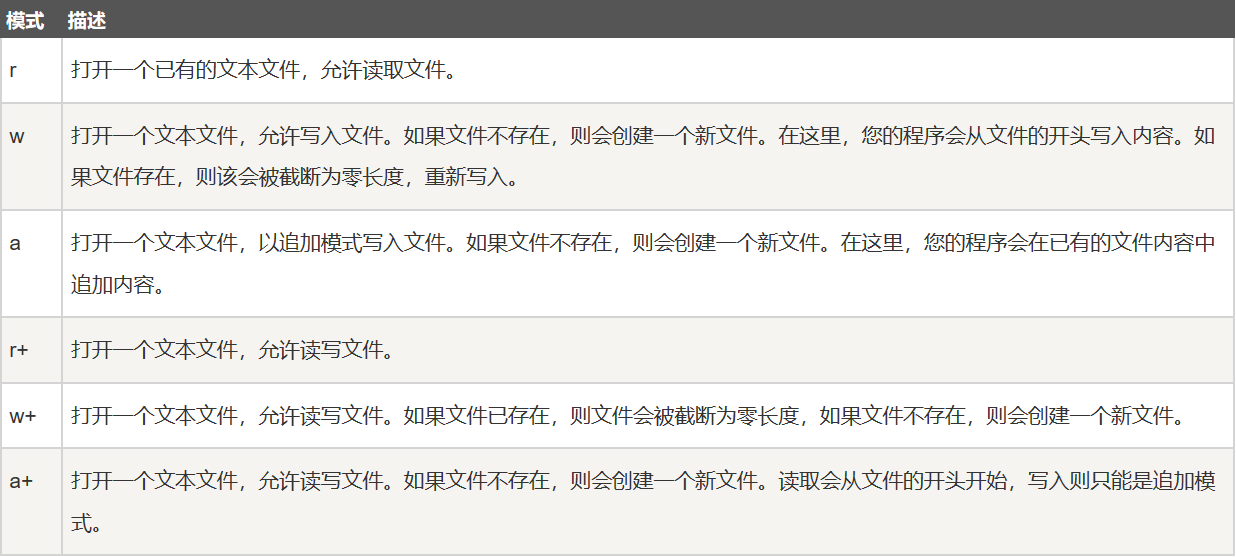文件打开类型:

文件打开输出就用:
1 #include <stdio.h>
2
3 int main()
4 {
5 FILE *fp = NULL;
6
7 fp = fopen("/tmp/test.txt", "w+"); //第一个逗号前是文件位置。逗号之后是打开文件方式
8 fprintf(fp, "This is testing for fprintf...\n"); //逗号之前是一个指针,表明往里面输入。逗号之后fprintf是往文件里面输入
9 fputs("This is testing for fputs...\n", fp);
10 fclose(fp); //记得用完关闭文件
11 }
文件打开读取:
1 #include <stdio.h>
2
3 int main()
4 {
5 FILE *fp = NULL;
6 char buff[255];
7
8 fp = fopen("/tmp/test.txt", "r");
9 fscanf(fp, "%s", buff); //写入的时候和平常没有区别,还是只有字符串变量前不加‘&’,其他int、double等类型前都要加‘&’符号
10 printf("1: %s\n", buff );
11
12 fgets(buff, 255, (FILE*)fp); //scanf遇到空格就会断开,gets会读取空格,遇到换行就结束
13 printf("2: %s\n", buff ); //255是限制最大读取内容长度
14
15 fgets(buff, 255, (FILE*)fp);
16 printf("3: %s\n", buff );
17 fclose(fp);
18
19 }
文件读去和写入:
文件判断是否结尾要用feof()函数
1 #include <stdio.h>
2 int main()
3 {
4 FILE *fp = NULL;
5 double buff;
6 double s;
7 int w;
8 scanf("%lf",&s);
9 w=s;
10 fp = fopen("coursese.txt", "w");
11 fprintf(fp,"%lf %lf %d",s,s,w); //这个%d后面不能加'\n',因为在文件中虽然一行什么东西都没有但是这一行确实存在,那么就不会
12 fclose(fp); //遇到文件结束标志。不仅换行不能交,空格也不能交
13 //即fprintf(fp,"%lf %lf %d ",s,s,w);、fprintf(fp,"%lf %lf %d ",s,s,w); 这两种形式都错
14 fp = fopen("coursese.txt", "r");
15 while(1){
16 if(feof(fp)) break;
17 fscanf(fp, "%lf%lf%d", &buff,&s,&w);
18 printf("%lf %lf %d\n",buff,s,w);
19 }
20 fclose(fp);
21 }
加上%s也可以:
1 #include <stdio.h>
2 int main()
3 {
4 FILE *fp = NULL;
5 double buff;
6 double s;
7 int w;
8 char ss[55];
9 scanf("%lf",&s);
10 scanf("%s",ss);
11 w=s;
12 fp = fopen("coursese.txt", "w");
13 fprintf(fp,"%lf %lf %d %s",s,s,w,ss); //这个%d后面不能加'\n',因为在文件中虽然一行什么东西都没有但是这一行确实存在,那么就不会
14 fclose(fp); //遇到文件结束标志。不仅换行不能交,空格也不能交
15 //即fprintf(fp,"%lf %lf %d ",s,s,w);、fprintf(fp,"%lf %lf %d ",s,s,w); 这两种形式都错
16 fp = fopen("coursese.txt", "r");
17 while(1){
18 if(feof(fp)) break;
19 fscanf(fp, "%lf%lf%d%s", &buff,&s,&w,ss);
20 printf("%lf %lf %d %s\n",buff,s,w,ss);
21 }
22 fclose(fp);
23 }
还有一种判断文件结束方式:fgetc()
但是这个函数相当于getchar(),它会在文件中吸取一个字符,这样的话文件指针就会向后移动一位,从而导致拿出来的时候数据和进去的时候不一样
代码:
1 #include <stdio.h>
2 int main()
3 {
4 FILE *fp = NULL;
5 double buff;
6 double s;
7 int w;
8 char ss[55];
9 scanf("%lf",&s);
10 scanf("%s",ss);
11 w=s;
12 fp = fopen("coursese.txt", "w");
13 fprintf(fp,"%lf %lf %d %s",s,s,w,ss);
14 fclose(fp);
15 fp = fopen("coursese.txt", "r");
16
17 char ch;
18 while(1){
19 ch=fgetc(fp);
20 if(ch==EOF) break;
21 fscanf(fp, "%lf%lf%d%s", &buff,&s,&w,ss);
22 printf("%lf %lf %d %s\n",buff,s,w,ss);
23 }
24 fclose(fp);
25 }
考虑到它判断文件的方式,我们可以输入的时候在每一条数据前面多加一个空格,来充当那个fgetc吸收的无用字符
代码:
1 #include <stdio.h>
2 int main()
3 {
4 FILE *fp = NULL;
5 double buff;
6 double s;
7 int w;
8 char ss[55];
9 scanf("%lf",&s);
10 scanf("%s",ss);
11 w=s;
12 fp = fopen("coursese.txt", "w");
13 fprintf(fp," %lf %lf %d %s",s,s,w,ss); //前面多加了一个空格。也可以加其他
14 fclose(fp);
15 fp = fopen("coursese.txt", "r");
16
17 char ch;
18 while(1){
19 ch=fgetc(fp);
20 if(ch==EOF) break;
21 fscanf(fp, "%lf%lf%d%s", &buff,&s,&w,ss);
22 printf("%lf %lf %d %s\n",buff,s,w,ss);
23 }
24 fclose(fp);
25 }
二进制读写可以看菜鸟教程